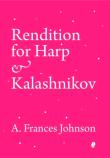AustLit
Latest Issues
AbstractHistoryArchive Description
'This new collection extends themes taken up in The Wind-up Birdman of Moorabool Street (2012). Environmental degradation and theme park notions of the natural endure. Accordingly, these poems reflect with tenderness, anger and irony on the ways humans chronicle, construct and war upon their natural environments. ‘Rendition’ puns on the idea of a song lyric, translation, surrender and also torture. In the anti-pastoral, anti-war poems offered here, groups of human beings and individuals are also shown as either tragically marginalized, lost or held too close. Cautionary ecocritical threnodies splice with personal elegies and historical cultural reflections to suggest a world awash with maladies of different kinds, as if to say that human beings must recalibrate love, death, survival and history as matters of urgency.'
Source: Publisher's blurb.
Publication Details of Only Known VersionEarliest 2 Known Versions of
Works about this Work
-
Explosions in Quiet Rooms
2019
single work
review
— Appears in: TEXT : The Journal of the Australian Association of Writing Programs , October vol. 23 no. 2 2019;
— Review of Rendition for Harp and Kalashnikov 2017 selected work poetry'In her latest, and strikingly titled book of poems, award-winning poet A Frances Johnson presents ‘anti-pastoral, anti-war poems’, and produces a body of work which ‘puns on the idea of a song lyric, translation, surrender and also torture’ (Melbourne Prize for Literature 2018).' (Introduction)
-
A. Frances Johnson: Rendition for Harp & Kalashnikov
2018
single work
essay
— Appears in: Australian Poetry Review , vol. 13 no. 2018;'This new book by A. Frances Johnson has the same neat three-part structure as her second. But whereas The Wind-up Birdman of Moorabool Street was divided into past, present and future (with the future significantly coming first), Rendition for Harp & Kalashnikov is built around three homophonic puns: Soar, Sore and Saw. And although the new book has some significant differences of emphasis, it clearly comes from the same stable. It begins as did The Wind-up Birdman of Moorabool Street, for example, with poems about the kind of grotesque interpenetration of what should be different orders of existence, focussing on the present development and future possibilities of drone technology, especially that part of the technology which eschews crude flying- and guided-bombs in favour of a birdlike mechanism with only minimal effect on the environment it’s exploring. Understandably these poems don’t pass up the opportunity to criticise the murderous American use of drones in Afghanistan and Pakistan – the last of the poems about mechanical birds, “Soar II: String That Holds the Sky”, focusses on the moving testimony of the son and grandchildren of a woman killed by a drone strike in Pakistan – but poetry, being what it is, responds better to free-ranging imaginative possibilities than it does to moral outrage. As a result the best of these drone poems seem to me to be those which focus on the ambivalent status of these UAVs themselves. “Microaviary” from The Wind-up Birdman of Moorabool Street, for example, concluded with a poem, “Hummingbird versus Raven”, in which both “birds” abandoned their military destinies and pursued their own lives, the Raven heading for Africa and the Hummingbird, in Bavaria, “attempting to build a nest out of nails in the forest of Odin”.' (Introduction)
-
Explosions in Quiet Rooms
2019
single work
review
— Appears in: TEXT : The Journal of the Australian Association of Writing Programs , October vol. 23 no. 2 2019;
— Review of Rendition for Harp and Kalashnikov 2017 selected work poetry'In her latest, and strikingly titled book of poems, award-winning poet A Frances Johnson presents ‘anti-pastoral, anti-war poems’, and produces a body of work which ‘puns on the idea of a song lyric, translation, surrender and also torture’ (Melbourne Prize for Literature 2018).' (Introduction)
-
A. Frances Johnson: Rendition for Harp & Kalashnikov
2018
single work
essay
— Appears in: Australian Poetry Review , vol. 13 no. 2018;'This new book by A. Frances Johnson has the same neat three-part structure as her second. But whereas The Wind-up Birdman of Moorabool Street was divided into past, present and future (with the future significantly coming first), Rendition for Harp & Kalashnikov is built around three homophonic puns: Soar, Sore and Saw. And although the new book has some significant differences of emphasis, it clearly comes from the same stable. It begins as did The Wind-up Birdman of Moorabool Street, for example, with poems about the kind of grotesque interpenetration of what should be different orders of existence, focussing on the present development and future possibilities of drone technology, especially that part of the technology which eschews crude flying- and guided-bombs in favour of a birdlike mechanism with only minimal effect on the environment it’s exploring. Understandably these poems don’t pass up the opportunity to criticise the murderous American use of drones in Afghanistan and Pakistan – the last of the poems about mechanical birds, “Soar II: String That Holds the Sky”, focusses on the moving testimony of the son and grandchildren of a woman killed by a drone strike in Pakistan – but poetry, being what it is, responds better to free-ranging imaginative possibilities than it does to moral outrage. As a result the best of these drone poems seem to me to be those which focus on the ambivalent status of these UAVs themselves. “Microaviary” from The Wind-up Birdman of Moorabool Street, for example, concluded with a poem, “Hummingbird versus Raven”, in which both “birds” abandoned their military destinies and pursued their own lives, the Raven heading for Africa and the Hummingbird, in Bavaria, “attempting to build a nest out of nails in the forest of Odin”.' (Introduction)




